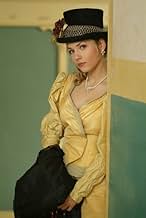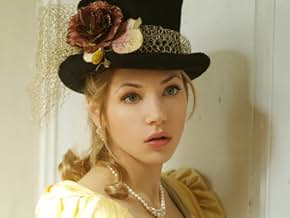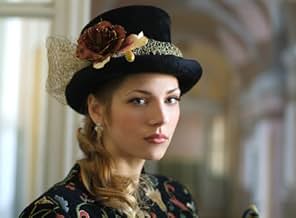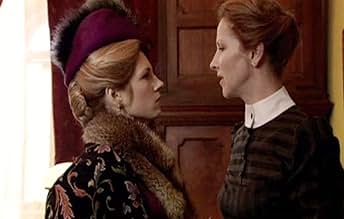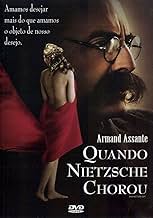IMDb RATING
6.4/10
5.1K
YOUR RATING
Viennese doctor Josef Breuer meets with philosopher Friedrich Nietzsche to help him deal with his despair.Viennese doctor Josef Breuer meets with philosopher Friedrich Nietzsche to help him deal with his despair.Viennese doctor Josef Breuer meets with philosopher Friedrich Nietzsche to help him deal with his despair.
Michal Yannai
- Bertha
- (as Michal Yanai)
Ayana Haviv
- Singer - 'Hymnus an den leben'
- (uncredited)
- Director
- Writers
- All cast & crew
- Production, box office & more at IMDbPro
Featured reviews
Occasionally ridiculous in the dream/hypnotherapy sequences and borderline slapstick bio-pic in others, 'When Nietzsche Wept' somehow remained compelling enough to have me sit right through to the end despite an unconvincing father of psychoanalysis still having to show ID for the age of consent (Jamie Elman as Freud) and Katheryn Winnick as cigar chomping proto ladette femme fatale Lou Salome.
There is very little exploration of Nietzche's philosophical ideas here but instead his incredibly prescient innovation in the realm of psychology as seen through the prism of the incipient discipline of psychoanalysis in Vienna circa 1882. Ben Cross is brilliant as the likeable albeit conveniently repressed and commensurately flawed Dr Breuer, adrift in a loveless marriage, a materially successful career but bereft of passion, danger or excitement in his unfailingly dutiful life. Things start to resemble the relationship between poets Verlaine and Rimbaud at this point (see Agnieszka Holland's 'Total Eclipse' from 1995) with Nietzsche advising Breuer to throw off the shackles of his unthinking conformity and embrace his freedom. Nietzsche certainly never did this, having died a virgin (despite being portrayed in a whorehouse) and was an invalid for most of his adult life on a pension paid for by academia. Whether Breuer actually makes this existential plunge is open to debate as the Director would have us believe this whole extended sequence was under Freudian hypnosis. Armand Assante was assigned one of the most thankless casting gigs of all time by being asked to portray the most innovative and radical thinker humankind has produced in over a thousand years. My gut feeling, on a personal level is that when Friedrich Nietzsche entered a room, that room got larger i.e. Assante exudes a cynical but palpable personality consistent with what he sees as his remit but I suspect Nietzsche was silent, inscrutable and withdrawn which is clearly anathema to cinematic portrayals. The movie is based on Irvin D. Yalom's 1992 novel which I haven't read but is purportedly concerned with the idea of limerence which as an idea is about as robust as 'gender' in 2023.
There is very little exploration of Nietzche's philosophical ideas here but instead his incredibly prescient innovation in the realm of psychology as seen through the prism of the incipient discipline of psychoanalysis in Vienna circa 1882. Ben Cross is brilliant as the likeable albeit conveniently repressed and commensurately flawed Dr Breuer, adrift in a loveless marriage, a materially successful career but bereft of passion, danger or excitement in his unfailingly dutiful life. Things start to resemble the relationship between poets Verlaine and Rimbaud at this point (see Agnieszka Holland's 'Total Eclipse' from 1995) with Nietzsche advising Breuer to throw off the shackles of his unthinking conformity and embrace his freedom. Nietzsche certainly never did this, having died a virgin (despite being portrayed in a whorehouse) and was an invalid for most of his adult life on a pension paid for by academia. Whether Breuer actually makes this existential plunge is open to debate as the Director would have us believe this whole extended sequence was under Freudian hypnosis. Armand Assante was assigned one of the most thankless casting gigs of all time by being asked to portray the most innovative and radical thinker humankind has produced in over a thousand years. My gut feeling, on a personal level is that when Friedrich Nietzsche entered a room, that room got larger i.e. Assante exudes a cynical but palpable personality consistent with what he sees as his remit but I suspect Nietzsche was silent, inscrutable and withdrawn which is clearly anathema to cinematic portrayals. The movie is based on Irvin D. Yalom's 1992 novel which I haven't read but is purportedly concerned with the idea of limerence which as an idea is about as robust as 'gender' in 2023.
Fine production values, a dry sense of humor throughout, literate script, decent casting (Assante transcends his usual "heroics" and plays a crumbling soul nicely and Cross is always workmanlike and solid), and, slyly, the film (as the book did) finally gives Nietzsche credit for inventing modern psychoanalysis (since Freud, et al, in the field stole from his works outrageously and lavishly, without assigning him the proper credit for his startlingly original insights into the world-historical human, all too human capacity for self-deception).
A tough work for an adaptation, but this movie succeeds where something like "Freud" dismally collapsed into timid clichés.
Nietzsche would have gotten many a devilish laugh out of this work's visual craftiness.
And appreciated being treated, not as a cartoon "Overman" idol, but a struggling, flawed, tragic-comically-profound human.
"Ecce Homo", his anti-"autobiography" warned those who followed not to take him too seriously.
If this film stimulates a few people to pick up his "Joyful Wisdom" (La Gaya Scienza) or "Dawn", it will have made its honorable point.
Yalom was, in essence, giving Nietszche a posthumous brother's embrace for his loneliness and struggle and brilliance and scorn and lack of recognition while he lived.
This movie does the same.
To a guy, who, friendless and abandoned and ignored through much of his writing life, still affirmed the Universe and humanity in the words:
"Man would rather have the Void for a purpose than be void of purpose." -F.N.
Worth a viewing.
A tough work for an adaptation, but this movie succeeds where something like "Freud" dismally collapsed into timid clichés.
Nietzsche would have gotten many a devilish laugh out of this work's visual craftiness.
And appreciated being treated, not as a cartoon "Overman" idol, but a struggling, flawed, tragic-comically-profound human.
"Ecce Homo", his anti-"autobiography" warned those who followed not to take him too seriously.
If this film stimulates a few people to pick up his "Joyful Wisdom" (La Gaya Scienza) or "Dawn", it will have made its honorable point.
Yalom was, in essence, giving Nietszche a posthumous brother's embrace for his loneliness and struggle and brilliance and scorn and lack of recognition while he lived.
This movie does the same.
To a guy, who, friendless and abandoned and ignored through much of his writing life, still affirmed the Universe and humanity in the words:
"Man would rather have the Void for a purpose than be void of purpose." -F.N.
Worth a viewing.
It is not a great movie. It is not a masterpiece. It may be boring and fake at first sight. But... A film about a Nietsche. Not very different of the philosopher. The character is seductive, power and Armand Assante is brilliant in his skin. The atmosphere is carefully recreated. Colors, gestures, social conceptions are pieces of a small visual museum. So, the movie is a good introduction to understand the shadows of XIX century end. For look the existence with the eyes of men of a special way to discover the essence of to be. Certainly, the film gives only sketches of great people. Lou Salome is more than strange muse of a philosopher and Nietsche is prophet in another sense than the character. No bad, no extraordinary. Only good subject of reflection. And introduction to cultural scene.
The first thing to make you judge well is that you know this movie is built on a fiction novel just like "The last temptation of Christ", so it's not real and not meant to say anything about the real Freud or Bruer or Nietzsche themselves.
you just have to fall deep into this good story and be sure it's a very touching one, as you know how a very strong man can cry over a moment, one moment.... nothing like you ever can expect.
I found the dreams amazingly directed as you know most directors make silly dream scenes, and the music also was just a very wise pick since nothing made but just picked from known and famous classics, that made it closer to the ear.
i suggest it as a-must-see movie
you just have to fall deep into this good story and be sure it's a very touching one, as you know how a very strong man can cry over a moment, one moment.... nothing like you ever can expect.
I found the dreams amazingly directed as you know most directors make silly dream scenes, and the music also was just a very wise pick since nothing made but just picked from known and famous classics, that made it closer to the ear.
i suggest it as a-must-see movie
I read the book several years ago, and didn't remember much of it, beyond being fascinated by the psychological-philosophical explorations of the legendary characters and intrigued by the migraine issues that Nietszche and Breuer attempt to solve. But the book is deeply intellectual, and it was difficult to imagine it translated to the screen. Unfortunately, the director's interpretation falls very limp indeed, despite valiant attempts by a cast of worthy actors.
Melodrama substitutes in most scenes for subtlety and quiet depth. Two-dimensional beauty in the female characters substitutes for the much harder to convey inner beauty.
I found the heavy-handed artificial accents maintained by all to be especially distracting, if not constantly irritating -- the thick German/Austrian/Russian accents were like bad scenery pulling the focus from any authentic expression of the characters. The wisdom of Nietszche is disappointingly obscured in this mediocre effort.
"And if you gaze for long into an abyss, the abyss gazes also into you."
Melodrama substitutes in most scenes for subtlety and quiet depth. Two-dimensional beauty in the female characters substitutes for the much harder to convey inner beauty.
I found the heavy-handed artificial accents maintained by all to be especially distracting, if not constantly irritating -- the thick German/Austrian/Russian accents were like bad scenery pulling the focus from any authentic expression of the characters. The wisdom of Nietszche is disappointingly obscured in this mediocre effort.
"And if you gaze for long into an abyss, the abyss gazes also into you."
Did you know
- Quotes
Josef Breuer: How could I have given up everything?
Nietzsche: You'd given up everything long before you met me.
Josef Breuer: Yes, but now I have nothing.
Nietzsche: Nothing *is* everything. In order to grow strong, you must first sink your roots deep into nothingness. Learn to face your loneliest loneliness.
- How long is When Nietzsche Wept?Powered by Alexa
Details
- Release date
- Country of origin
- Official sites
- Language
- Also known as
- Nietzsche Ağladığında
- Filming locations
- Production company
- See more company credits at IMDbPro
- Runtime
- 1h 45m(105 min)
- Color
- Sound mix
- Aspect ratio
- 1.85 : 1
Contribute to this page
Suggest an edit or add missing content


